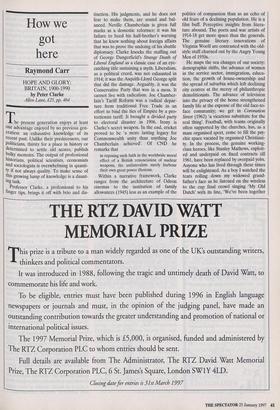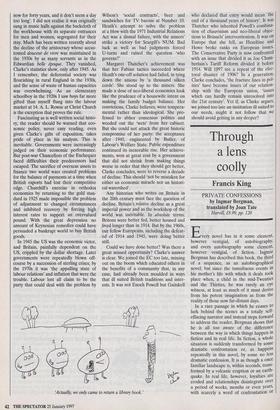How we got here
Raymond Carr
HOPE AND GLORY: BRITAIN, 1900-1990 by Peter Clarke Allen Lane, £25, pp. 464 The present generation enjoys at least One advantage enjoyed by no previous gen- eration: an exhaustive knowledge of its recent past. Unlike their predecessors, our politicians, thirsty for a place in history or determined to settle old scores, publish bulky memoirs. The output of professional historians, political scientists, economists and sociologists is overwhelming in quanti- ty if not always quality. To make sense of this growing lump of knowledge is a daunt- ing task.
Professor Clarke, a professional to his finger tips, brings it off with brio and dis-
tinction. His judgments, and he does not fear to make them, are sound and bal- anced. Neville Chamberlain is given full marks as a domestic reformer; it was his failure to heed his half-brother's warning that he knew nothing about foreign affairs that was to prove the undoing of his shuttle diplomacy. Clarke knocks the stuffing out of George Dangcrfield's Strange Death of Liberal England as a classic case of an eye- catching title sustaining a myth. Liberalism, as a political creed, was not exhausted in 1914; it was the Asquith-Lloyd George split that did the damage. Arguably, it was the Conservative Party that was in a mess. It cannot live with radicalism. Joe Chamber- lain's Tariff Reform was a radical depar- ture from traditional Free Trade in an effort to bind the ties of Empire by a pro- tectionist tariff. It brought a divided party to electoral disaster in 1906. Irony is Clarke's secret weapon. In the end, cricket proved to be 'a more lasting legacy for Commonwealth unity than anything Joe Chamberlain achieved'. Of CND he remarks that
in reposing such faith in the worldwide moral effect of a British renunciation of nuclear weapons, the unilateralists surely harbour their own great power illusions.
Within a narrative framework, Clarke ranges from the architecture of Odeon cinemas to the institution of family allowances (1945) less as an example of the politics of compassion than as an echo of old fears of a declining population. He is a film buff. Perceptive insights from litera- ture abound. The poets and war artists of 1914-18 get more space than the generals. The genuine literary innovations of Virginia Woolf are contrasted with the old- style stuff churned out by the Angry Young Men of 1950s.
He maps the sea changes of our society: demographic shifts, the advance of women in the service sector, immigration, educa- tion, the growth of house-ownership and the spread of suburbia which left declining city centres at the mercy of philanthropic demolitionists. The advance of television into the privacy of the home strengthened family life at the expense of the old face-to- face community; we get in Coronation Street (1962) 'a vicarious substitute for the real thing'. Football, with teams originally often supported by the churches, has, as a mass organised sport, come to fill the psy- chic space vacated by organised Christiani- ty. In the process, the genuine working- class heroes, like Stanley Mathews, exploit- ed and underpaid on fixed contracts till 1961, have been replaced by overpaid yobs. Anyone who has lived through these times will be enlightened. As a boy I watched the tears rolling down my widowed grand- father's face as he listened on the wireless to the cup final crowd singing 'My Old Dutch' with its line, 'We've been together now for forty years, and it don't seem a day too long'. I did not realise it was originally sung in music halls against the backcloth of the workhouse with its separate entrances for men and women, segregated for their stay. Much has been written recently about the decline of the aristocracy whose accus- tomed douceur de vivre was maintained in the 1930s by as many servants as in the Edwardian belle époque. They vanished, Clarke's statistics show, only after 1945. As I remember, the deferential society was flourishing in rural England in the 1930s, and the sense of waste of human capacities was overwhelming. As an elementary schoolboy in the 1920s I saw boys far more gifted than myself flung into the labour market at 14. A. L. Rowse at Christ Church is the exception that proves the rule.
Fascinating as is well written social histo- ry, the reader should be warned that eco- nomic policy, never easy reading, even given Clarke's gifts of exposition, takes pride of place in his analysis. This is inevitable. Governments were increasingly judged on their economic performance. But post-war Chancellors of the Exchequer faced difficulties their predecessors had escaped. The sacrifice of overseas assets to finance two world wars created problems for the balance of payments at a time when British exports had lost their competitive edge. Churchill's exercise in orthodox economics by returning to the gold stan- dard in 1925 made impossible the problem of adjustment to changed circumstances and inhibited recovery by forcing high interest rates to support an overvalued pound. With the great depression no amount of Keynesian remedies could have persuaded a bankrupt world to buy British goods.
In 1945 the US was the economic victor, and Britain, painfully dependent on the US, crippled by the dollar shortage. Later governments were repeatedly blown off- course by a succession of sterling crises; by the 1970s it was 'the appalling state of labour relations' and inflation that were the trouble. Labour lost all claim to be the party that could deal with the problem by Wilson's 'social contracts', beer and sandwiches for TV barons at Number 10. Heath's attempt to solve the problem at a blow with the 1971 Industrial Relations Act was a dismal failure, with the miners' strike a victory for Scargill's NUM. Bad luck as well as bad judgments forced U-turns and raised the question 'who governs?'
Margaret Thatcher's achievement was that her Fabian tactics succeeded where Heath's one-off solution had failed, in tying down the unions by 'a thousand silken cords'. She stood up to the miners. She made a dose of neo-liberal economics look like the prudence of a housewife intent on making the family budget balance. Her convictions, Clarke believes, were tempera- mental rather than ideological. She pro- fessed to abhor consensus politics and weeded out the 'wets' from her cabinet. But she could not attack the great historic compromise of her party: the acceptance after 1945, engineered by Butler, of Labour's Welfare State. Public expenditure continued its inexorable rise. Her achieve- ments, won at great cost by a government that did not shrink from making things worse in order that they should get better, Clarke concludes, were to reverse a decade of decline. This should 'not be mistaken for either an economic miracle nor an histori- cal watershed'.
Any historian who writes on ,Britain in the 20th century must face the question of decline. Britain's relative decline as a great imperial power and as the workshop of the world was inevitable. In absolute terms, Britons were better fed, better housed and lived longer than in 1914. But by the 1960s, our fellow Europeans, including the defeat- ed of 1914 and 1945, were doing better still.
Could we have done better? Was there a great missed opportunity? Clarke's answer is clear. We joined the EC too late, missing out on the boom which educated others in the benefits of a community that, in any case, had already been moulded in ways that ill suited British traditions and inter- ests. It was not Enoch Powell but Gaitskell `Actually, we only came to return a library book.' who declared that entry would mean 'the end of a thousand years of history'. It was Thatcher who inherited Powell's combina- tion of chauvinism and neo-liberal objec- tions to Brussels' interventionism. It was on Europe that she fell, as Heseltine and Howe broke ranks on European issues. The Conservative Party is now confronted with an issue that divided it as Joe Cham- berlain's Tariff Reform divided it before 1914. Will 1997 see a repeat of the elec- toral disaster of 1906? In a generation, Clarke concludes, 'the fracture lines in pol- itics' have become issues of our relation- ship with the European union, 'issues which can hardly remain unresolved into the 21st century'. Yet if, as Clarke argues, we joined too late an institution ill suited to our needs, might it not follow that we should avoid getting in any deeper?



































































 Previous page
Previous page